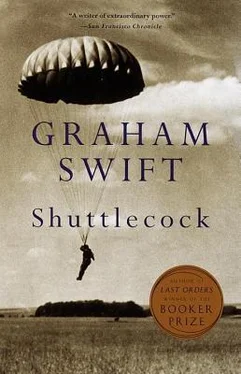I made a hollow in the undergrowth, covering myself with leaves, and curled up in it. Some tall beech trees groaned in the wind above me. I was shivering, semi-delirious, hungry (I should have eaten when food was offered me), had lost my sense of direction and did not know where I was. I remember thinking, before drifting into merciful sleep, Yes, I am no better than some burrowing animal.
And destiny was to intervene, miraculously, in the form of the American Seventh Army.…
On the way back from Quinn’s I stopped by at a pub — a little pub on the edge of Wimbledon Common I haven’t been to for some time. I got quite drunk, as if I were celebrating. But didn’t I have something to celebrate? Gain. Loss. Sometimes they’re the same thing. And whether it’s for better or worse, there’s something intoxicating, something exhilarating about those moments which make you realize life won’t ever be the same again. When I got back Marian said, ‘How’s Dad?’ and I looked at her in astonishment. And then I remembered that, of course, Marian thought I’d been to see Dad. ‘Haven’t you been to see Dad?’ she said. ‘Yes, yes. Dad’s fine,’ I said. ‘Fine, fine.’ And then I said, ‘I am going to be promoted. I am going to get Quinn’s job.’
Quinn’s house — or Quinn’s ground-floor flat, for such it turned out to be — was somewhere in the leafy region between Richmond Park and Richmond proper. Perhaps you know this district of solid old villas set amidst their own miniature woodlands, and little urban cottages along narrow lanes which imitate the country. Through gates and bay-windows and the odd open front door, you catch glimpses of expensively and elegantly furnished interiors — decanters on sideboards, framed prints on the walls, gilt mirrors, that sort of thing. I don’t like neighbourhoods of this sort. They smack of privilege and importance (you see how I betray my envy; the truth of the matter is these houses make me think of Dad and Mum’s house in Wimbledon) and they smack, too, with their burglar-alarms and brick walls capped with broken glass, of distrust, of secrecy. And I don’t like the way these civilized, urbane, well-pampered dwellings appropriate for themselves an air of the countryside as if they alone have a right to it. Because the trees, the leaves, they aren’t really like that at all. They are there for everyone. But, again, perhaps this is envy speaking.
It took me some while to find Quinn’s house — even though, in fact, it was not in one of the more secluded parts, but in a row not far from the main road. I admit, I was more than a little bit afraid. My heart was thumping, I was sweating. Were these the sort of surroundings, the sort of trappings that would be mine if I got Quinn’s job?
But something helped to put me at ease almost immediately. The house in which Quinn lived was a tall, three-storeyed building at one end of a smart terrace. Dark brick; white portico; brass letter-box. Railings separated the front area from the pavement, and to reach the front door (solid, glossy black) you had to climb four or five steps. I thought: what would you expect from a man who even at his place of work has to be approached by a flight of stairs? I was half prepared to see Quinn’s face at the front window, which was above street level, looking down at me as I got out of the car, just as he looked down at me, like a hawk, at the office. But all this was reversed as I passed through the front gate. For there, suddenly, was Quinn himself, standing not above me, but below me, in the little well around the basement window. He was wearing a loose, open-necked shirt, corduroy trousers and sandals, over socks, and was carrying a watering-can. One of his fingers was bandaged. I looked down at his sticky, bald forehead and the curls of grey hair visible where his shirt was open. He did not look like the boss of a police department but like some amiable, slightly dotty, retired professor.
‘Ah, Prentis. Excuse me receiving you like this. But the flowers, you know, they have to be looked after.’ There were pots of geraniums on the ledge of the basement window. ‘No, don’t go up to the front door — I seldom use it. This way.’ He gestured to the steps down, then ushered me along the little path around the side of the basement. ‘You look hot. Let me get you a drink.’
At the back of the building was a walled garden, with a lawn, roses, honeysuckle, two stunted apple trees and some rather rampant borders. Immediately to the rear of the basement, which was now on the level of the garden, was a small conservatory, opening onto a paved area on which there stood two wicker chairs and a fold-up table. I somehow expected all this. The conservatory was full of foliage. So Quinn was a lover of plants, too, a devotee of the flower-pot; like Marian. Through the conservatory was a large, sprawling kitchen, the result of more than one room knocked together — the sort of kitchen in which you can not only cook but eat, with several guests, and even lounge in like a living-room. From the cluttered, casual appearance of this room I got the impression that Quinn spent most of his time here. And, in fact, I never got to see the other rooms. I wanted to see all I could. For all the time, you see, I was looking for clues, for spy-holes into Quinn’s elusive private life. I wanted to know, for example, whether there had been — still was — a Mrs Quinn; whether Quinn — somewhere — had sons or daughters. I never discovered these things. But I discovered enough.
Round the kitchen and conservatory roamed two (later I saw a third) Siamese cats.
‘I’m going to have a gin with a big slosh of tonic and bags of ice. Will you join me?’
He beckoned me to sit down on one of the wicker chairs. While he busied himself inside at the fridge and the sink I noticed that in the conservatory, amongst a collection of various outdoor garments and implements — shoes, an old coat, a birch broom, walking-sticks — was a bag of golf-clubs.
He returned with two large, fizzing, clinking glasses. ‘There’s no need to behave as though we’re at the office. Please, don’t swelter in that jacket. Take your tie off.’
You see, I had dressed myself up smartly, like some boy applying for a job.
I took my glass. There were long bars of sunlight across the lawn; the fragrance of honeysuckle. I thought: where is the catch? As he gave me my drink I studied the bandage on the finger of his right hand.
We dipped our noses into our glasses and looked at the garden. Then Quinn spoke.
‘So you came, my dear chap. You know, I had my doubts whether you would. No, not really, I was sure you would.’ He took a hurried sip of gin — as if he had begun badly — then smacked his lips, and wiped his glasses which had become speckled with bubbles.
‘Now. You have some questions you want answered. And I have some explaining to do. That’s the position, isn’t it?’
He gave me a penetrating but shifting look. It was as though he had said, ‘You still want to go through with this?’
‘Excuse me for using a cliché, but I don’t know if this is going to be harder for me or for you. For me, it’s a confession — of a kind. For you — well, you must make up your own mind. I’m saying this just as a way of telling you that if you find yourself wanting to cut the whole thing short, to forget the whole thing — though somehow I don’t think you will — please, don’t hesitate.’
As he spoke, one of the Siamese cats came and rubbed itself sinuously against his leg. Quinn put out his hand and fondled the scruff of its neck. He did this, not in a gentle, stroking way, but almost roughly, as if, at any moment, his hand might close round the animal’s throat. Siamese cats, they say, are different from other cats. They don’t ooze affection. There’s something unpredictable, even sinister about them.
Читать дальше












